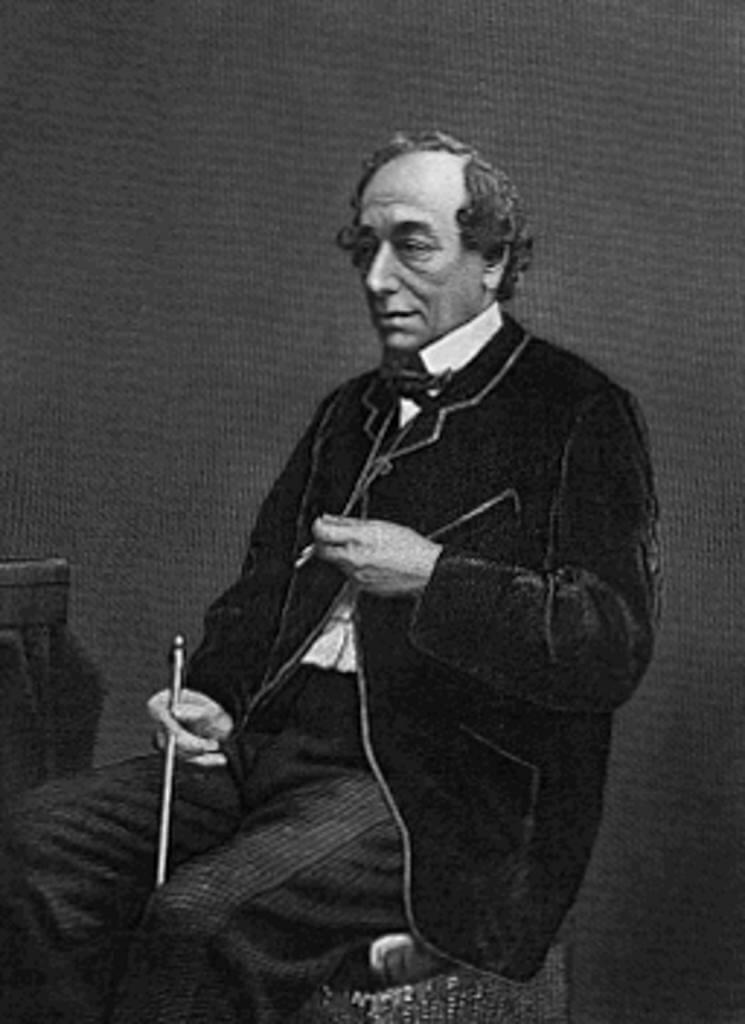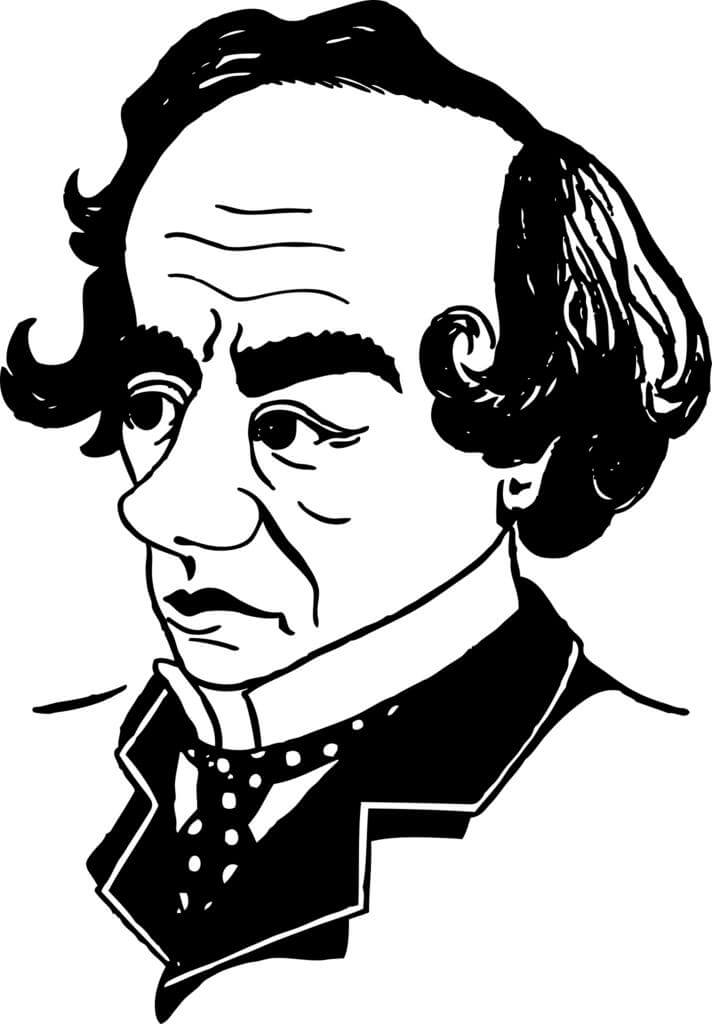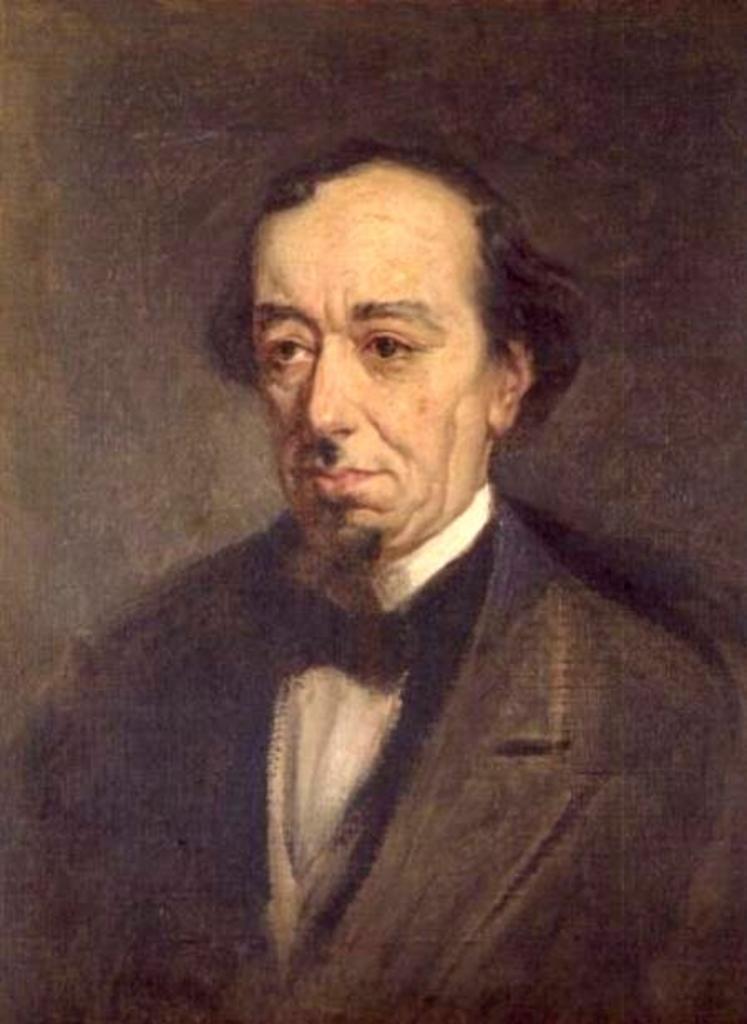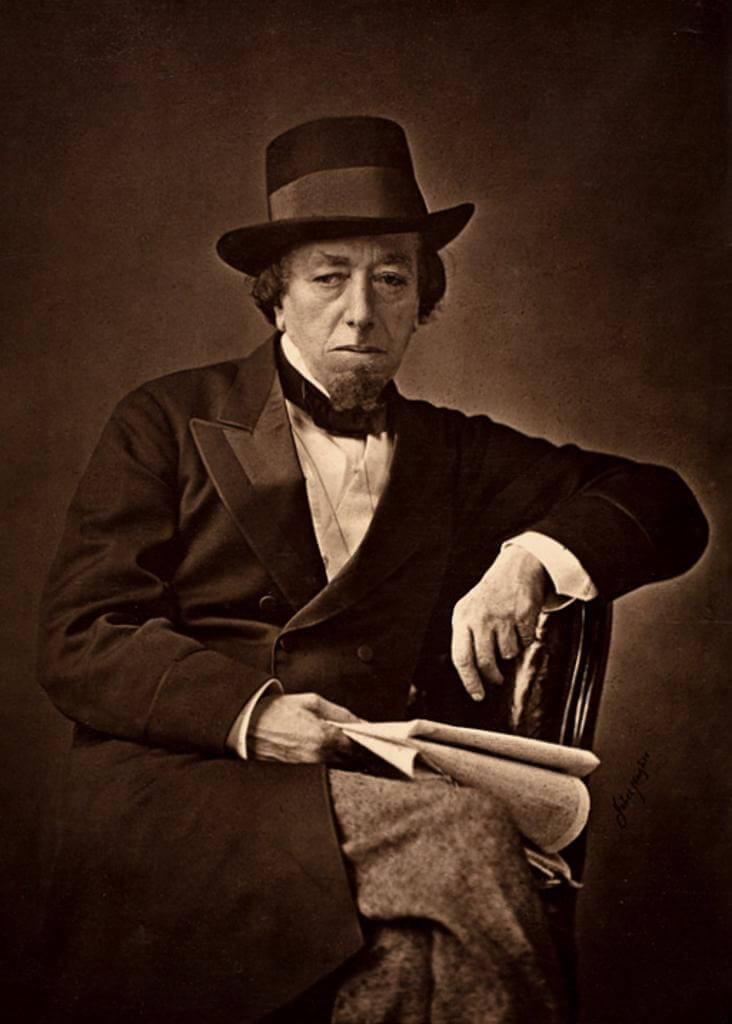Who was Benjamin Disraeli? Information on the 1st Earl of Beaconsfield Benjamin Disraeli biography, life story and political career.
Benjamin Disraeli;(1804-1881), British statesman and writer, better known as Benjamin Disraeli. Disraeli, who was prime minister of Britain in 1868 and 1874-1880, was the architect of the modern Conservative party and one of the most brilliant parliamentarians in the history of the House of Commons.
Disraeli was born in London on Dec. 12, 1804. His grandfather, Benjamin D’Israeli, emigrated to London in 1748 from a colony of Spanish Jews living near Venice; he prospered as a trader and stockbroker and married Sarah Shiprut, who was related to the prominent Portuguese Jewish family of Villareal. Their only son, Isaac Disraeli, became a respected man of letters in London. He married Maria Basevi, a descendant of Italian Jews. They had a daughter and subsequently four sons, the eldest of whom was Benjamin. In 1817, Isaac D’Israeli abandoned Judaism and in the same year his daughter and three surviving sons were baptized in the Anglican Church. Benjamin was educated at private schools at Blackheath and Epping Forest. He did not attend a university.

Source : wikipedia.org
Early Career.
When he was 17, Disraeli was apprenticed to a firm of London solicitors to study law. Although his name was entered on the roll at Lincoln’s Inn three years later, he never practiced law. From 1824 to 1826 he engaged in stock market and publishing ventures that proved disastrous and left him with debts he was unable or unwilling to pay.
Embittered but still full of confidence, he announced his intention to become a writer. Isaac Disraeli’s position gave Benjamin an easy entrance to literary society, and the young man’s style in dress and manner assured him attention there. Benjamin played the dandy. He was variously regarded as brilliant, clever, impudent, and vulgar.
His first novel, Vivian Grey, appeared anonymously in two volumes in 1826 and 1827. Its crude but lively satire of the activities of well-known contemporaries attracted considerable attention. Its author’s identity was soon disclosed, and the harsh ripostes directed at him contributed to the anxieties that brought on a nervous collapse in 1828. Disraeli retired to his father’s house in Buckinghamshire and avoided the spotlight entirely for the next three years. During that time he published an inferior novel, The Young Duke (1830). Following a 16-month trip to the Mediterranean in 1830-1831, he returned to Buckinghamshire and shortly announced his candidacy for Parliament as a Conservative from High Wycombe.
Entry into Politics.
Between 1832 and 1835, Disraeli offered himself as a candidate three times at High Wycombe and once at Taunton and lost all four elections. He bided his time but did a prodigious amount of writing, including numerous bombastic political pamphlets and the novels Contarini Fleming (1832) and Alroij (1833). Thereafter he published Vindication of the English Constitution (1835), an analysis of English history in which he first expressed his theory of popular Toryism as an alliance of the crown, the church, and the people against the Whig oligarchy. He wrote several other political works, mostly pamphlets, and two more novels: Henrietta Temple (1836), a love story based on his own liaison with Henrietta, the wife of Sir Francis Sykes; and Venetia (1837).
Election to Parliament.
In 1837, King William IV died. The accession of Victoria and the consequent formation of a new Parliament afforded Disraeli his long-awaited opportunity. The borough of Maidstone returned two members to Parliament, one of whom, Wyndham Lewis, held an assured seat. Through the influence of important friends, Disraeli was invited to enter the bitter contest for the other seat. During the ensuing campaign his character was attacked on fair and specious grounds. His unpaid debts, his racial origins, his open liaison with Mrs. Sykes, and his fierce, often wounding speeches in the past were used against him. But he pressed his campaign and won the seat.

Source : pixabay.com
His maiden speech in the House of Commons on Dec. 7, 1837, was a disaster. The speech itself was overwrought, and the speaker was, in the opinion of most members, overdressed. The combination of his ringlets and ruffles and the extravagance of his oratorical style produced shouts of derision from opponents and, before the speech was finished, general laughter in the house. Shouting to be heard, Disraeli concluded the debacle with the defiant prophecy: “I will sit down now, but the time will come when you will hear me.” Chastened by the experience, he gradually moderated his style.
Within a year, Wyndham Lewis, his conservative colleague from Maidstone, died, and on Aug. 28, 1839, Disraeli married Lewis’ widow. She brought him wealth, which he was never able to acquire in his own right, and the semblance of a social position. Although the marriage was contracted largely for practical reasons —his wife was 12 years his senior—they became an extremely devoted couple. Years later she declared: “Dizzy married me for my money, but if he had the chance again he would marry me for love.”
Rebellious Tory.
After his marriage Disraeli resolved to establish a firmer political position for himself. His idealized vision of a common cause between the Tory monarchy and the work-ingman led him into sympathy with Chartism, the first great political movement of the British working class. His skeptical view of the Reform Law of 1832 placed principal blame for the miseries of labor on the Whigs, but the pragmatism of the Tories led by Sir Robert Peel also clashed with his own ideas. When Peel rather curtly declined Disraeli’s irregular request to be include! in the Tory ministry formed in 1841, Disraeli resolved to loosen his ties with the party leadership and veered toward more outspoken support of workmen’s grievances.
Disraeli’s sympathy with the industrial poor was undoubtedly sincere. In an effort to present his view of what he saw as a conspiracy against them, he wrote two of his most persuasive novels: Coningsby (1844) and Sijbil, or the Two Nations (1845). Coningsby is a portrayal of the Young England movement that arose within Tory ranks in the 1840’s and looked to Disraeli for leadership. The novel’s effect was sensational. Its idealized view of conservatism’s role in regenerating England gave Disraeli the instrument he needed to split the Tory party and eventually erect a new Conservative party.
The opportunity presented itself in 1845, when Peel, in response to a new famine in Ireland, came out in support of repealing the corn laws—protective tariffs on foreign grain that favored landowners and burdened poor consumers. In doing so, Peel reversed a long-standing policy of the party. Disraeli and other protectionists rebelled. The repeal bill passed, with the support of the Whigs, but the rebels brought down the government in June 1846.
Party Leader.
The split and partial disintegration of the old Tory party inaugurated a long period of political confusion in which neither of the traditional parties had a clear majority. During the Whig administration (1846-1852) of Lord Russell, Disraeli advanced to the leadership of the Conservatives in Commons, but with the Peelites in active opposition to the party majority the prospect of a Conservative government seemed distant. Disraeli realized that the party’s stand on protectionism was unpopular, but his recent attacks on Peel prevented him from reversing his position.
After Russell’s government fell in 1852, Disraeli became chancellor of the exchequer in the minority government of the earl of Derby. Later in the year Derby’s government fell, and the Conservatives returned to the opposition for six more years, during most of which a coalition of small parties ruled. In 1858 a setback for the emerging Liberal party permitted the Conservatives, still led by Derby, to form another shortlived government. Disraeli seized the opportunity the following year to introduce a moderate bill dealing with long-overdue electoral reform. The measure was defeated, and the Conservatives returned to the opposition for seven more years.

Source : wikipedia.org
Already approaching 60 and his party’s leader in Commons for more than a decade, Disraeli saw his chances slipping away. He was doubly cheated by the long survival of Derby. In 1866, when the Conservatives installed a third minority government, an aged and ailing Derby again became prime minister, and Disraeli was again his chancellor of the exchequer.
First Prime Ministry.
Disraeli was determined that credit for electoral reform should go to the Conservatives. He introduced a bill in the House of Commons that became law in 1867, but the Liberals, whose majority in the House had attached important amendments to the bill, got most of the credit. In February 1868, Derby retired and Disraeli became prime minister. John Bright, a prominent Liberal, described the event as “a great triumph of intellect and courage and patience and unscrupulousness employed in the service of a party full of prejudices and selfishness and wanting in brains.”
Disraeli remained prime minister only until November, for the first general elections based on the new reform law returned the Liberals to power. Their commanding new leader was William Ewart Gladstone, whose personal vendetta with Disraeli helped finally to polarize two modern parties in Britain. Before Disraeli left office, Queen Victoria, whose fondness for him became legend, offered him a peerage. At his request, the title was conferred on his wife so that he might remain in Commons.
Opposition.
During the first few years of Gladstone’s administration Disraeli luxuriated in the comparative ease of opposition. For the first time in more than 20 years he wrote a novel, Lothair (1870), a gaudy romance that did nothing to enhance his prestige. Restive party members questioned his leadership. Nothing seemed to erode the popularity of the Liberals.
But after 1870, Disraeli concentrated on party organization, and the fortunes of the Conservatives began gradually to rise. Liberal defeats in by-elections signaled discontent with Gladstone’s concessions to Irish nationalism and with his accommodation to emerging Prussian and Russian power in Europe. Disraeli sensed the feeling of the country and shrewdly appealed to its damaged pride. On March 11, 1873, the Conservatives narrowly defeated a Liberal bill to create an Irish university for Catholics. Gladstone resigned and suggested that Disraeli form a minority government. Disraeli shrewdly refused, and Gladstone, whose popularity was rapidly declining, was forced to return. His mandate was exhausted. In January 1874 he dissolved Parliament, and in February the Conservatives won a majority of 83 seats—their first majority in a general election since 1841.
Second Prime Ministry.
Disraeli, for the first time, formed a new government. He was nearly 70 and had led his party in Commons longer than any man in the history of the House. Tragically he had had to wait too long. Age and intermittent illness, and loneliness after his wife’s death in 1872, denied him the vigor that he could have brought to the office earlier.
Disraeli formed a distinguished and able cabinet and set about redeeming his campaign promises to act on social welfare problems. In addition to landmark legislation on urban renewal and workers’ housing, his administration enacted a trade union act more favorable to the unions than earlier acts, a drug act, and the comprehensive Public Health Act of 1875, which codified numerous existing laws on health and sanitation. These and other laws filled important gaps in welfare legislation left by the Liberals.
In foreign affairs, which dominated the later years of his administration, Disraeli devoted his efforts to bolstering Britain’s declining prestige overseas. In 1875, acting entirely on his own initiative and against the advice of his foreign minister, he arranged government purchase of a substantial interest in the Suez Canal Company from the khedive of Egypt. Although not a controlling interest, it enhanced Britain’s imperial power, secured the nation lower canal rates, and led to eventual British control of the waterway. Disraeli’s secret canal transaction was both a diplomatic and political coup.

Source : wikipedia.org
In 1877, the year after Disraeli obtained from Parliament the addition of “Empress of India” to Queen Victoria’s titles, she created him earl of Beaconsfield. In 1878, Beaconsfield successfully checked Russian imperialism in Turkey and the Balkans. Using the threat of intervention and exercising masterly control of the European delegates called at his urging to the Congress of Berlin in 1878, he engineered a revision, extremely favorable to Britain, of the treaty ending the Russo-Turkish War.
Disraeli’s prestige was never higher, but he was rapidly failing in health. Against his wishes, he remained in office, but renewed problems at home and abroad brought defeat to his party in the general election of April 1880. He retired from politics to finish Endymion, his last novel. He died at his London house on April 19, 1881.
mavi